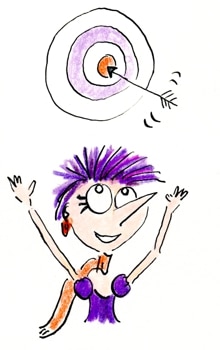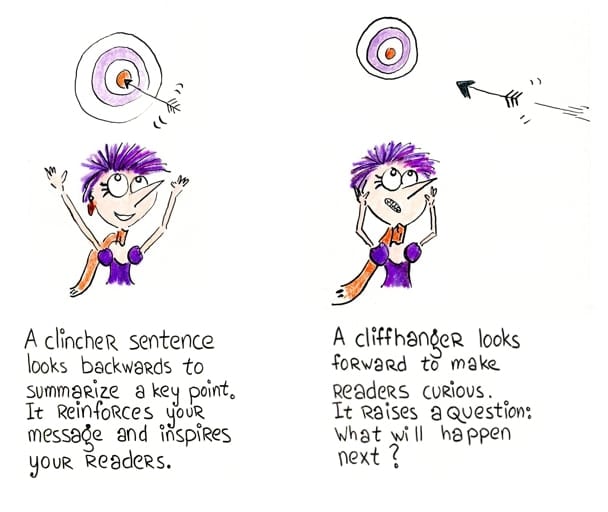What Is A Clincher Sentence
A clincher sentence is a last sentence reinforcing your key message.
![]()
How to write clinchers
 Information technology happens to me surprisingly often.
Information technology happens to me surprisingly often.
I'm one-half skimming, half reading a fairly interesting commodity—all the way until the last word.
But as soon equally I've finished, I've already forgotten what I've read.
Sound familiar?
If you want readers to remember your words, y'all demand to invigorate your message and bound-start your readers into action. And the easiest manner to do that? Write clincher sentences.
Eh … what is a clincher sentence?
A clincher sentence is a terminal sentence reinforcing your central message.
You'll find clinchers as the last sentence of a well-written blog post, essay, or book affiliate; or at the end of a section in a blog post—before a subhead introduces the next section.
A clincher judgement is a soundbite, communicating a nugget of wisdom. It's a memorable betoken that may linger in your reader's mind long after she'southward finished reading your content.
Want to know how to write these powerful sentences?
Examples of clincher sentences
In his memoir "My Father, the Pornographer," Chris Offutt ends most chapters with excellent clincher sentences.
For instance, the ending of chapter four gives us insight in the son'southward relationship with his father:
(…) I realized the landscape would always agree me tight, that I could never escape, that in fact what I loved and felt most loyal to were the wooded hills, and non my father.
And affiliate 20-v ends like this (note: cons refers to conventions where his father's fans would gather):
Dad seldom left the house over which he held utter dominion. When he did leave, he went to cons, an surroundings that assuaged his ego in every way. He grew accustomed to these two extremes and became resentful when his family failed to care for him like fans did. We disappointed him with our need for a begetter.
If writing was a battle match, the clincher judgement would be the knockout accident.
But how do you evangelize a killer dial?
How to write a clincher sentence
To write a clincher sentence, you starting time must know your key message.
And so, retrieve well-nigh this: If readers would recollect one thing from your article or volume chapter, what would it be?
If you can't think of the central bulletin, your idea might still be a niggling fuzzy. Let it simmer for a while, and then revisit your mail service. Which question practise you want to reply? What problem practise you assistance solve? What is your key tip?
To get unstuck, use one of these judgement starters to assist formulate your key point:
- In decision (or ultimately), [add your last say on the topic or sum upwardly your statement]
- Recall, [remind readers of your cardinal idea—sometimes you lot but demand to rephrase an earlier judgement]
- Your activeness: [tell readers what to do with your advice]
- Your takeaway: [sum up the primary point readers should remember]
In educational or inspirational writing, you tin can use the two-dial approach. Firstly, remind readers what you've explained already. And secondly, nudge them to implement your advice.
For instance, Mark Manson uses this approach in his article nearly the nearly of import question of your life. His penultimate sentence summarizes his key point:
This is the well-nigh simple and basic component of life: our struggles decide our successes.
And his final sentence addresses the reader directly to nudge him to implement his advice:
Then choose your struggles wisely, my friend.
At the end of their book "Made to Stick," Chip and Dan Heath take the same arroyo. The penultimate sentence summarizes their key point:
Stories have the amazing dual power to simulate and to inspire.
And their very last judgement encourages readers to implement their advice by telling them information technology's not as hard as they might call back:
And most of the time we don't even have to use much creativity to harness these powers—nosotros just demand to be ready to spot the good ones that life generates every twenty-four hours.
Remember, your clincher sentence is the killer punch encouraging readers to implement your advice.
And then, summarize and inspire.
Make your killer dial reflect
My favorite type of clincher sentence sketches a brilliant image, giving free energy to your key idea.
Here's how Chris Offutt ends chapter 5 of his memoir with a vivid story—the clincher judgement is the terminal judgement (I made it bold):
A week afterward the memorial service [of my begetter], I took Mom to a greenhouse built of plastic sheeting. Mom selected a institute with white flowers, then smiled, shook her caput, and chose cherry flowers instead.
"Your father was color-blind," she said. "I but bought white flowers then he could see them."
She took the scarlet ones home. Afterwards fifty years Mom planted flowers she liked in her own backyard.
And Mark Manson sketches a vivid image at the end of his mail service about the existent value of money—the clincher sentence is in assuming:
The real value of money begins when we look beyond it and see ourselves as ameliorate, as more valuable, than it is. When it'southward not about the accumulation of stuff only rather the enactment of experiences. When it'south not about the mug but rather the coffee that's in it.
Vivid images haunt readers, popping upwardly in their minds hours—or even days—afterwards reading your content.
When to use a clincher judgement …
At the terminate of a book or web log post, y'all don't have a choice. To avert your writing petering out, stop with a clincher judgement.
However, at the stop of a book affiliate or web log mail section, yous can choose. You can either look ahead and make readers curious to read on, or you can look dorsum and summarize your primal message.
To look ahead, use a bewilderment to raise a question and make readers lean forward, eager to learn more than. For example, in the gripping book "American Kingpin: The Epic Chase for the Criminal Mastermind Behind the Silk Route," Nick Bilton uses cliffhanger sentences at the end of each chapter.
Here'southward the last judgement of the first chapter:
"You got a infinitesimal?" he said as he threw the white envelope on the desk-bound. "I take something important I demand to prove yous."
And chapter two:
And yet, equally he hopped into the car adjacent to his sister, he likewise didn't know that in simply five years he would exist making that amount of money in a single 24-hour interval.
And chapter three:
Just what wasn't clear to either of them, as they rolled around on his dinky bed in the basement, was that the relationship they were about to embark on would exist the almost tumultuous romance of Ross'due south and Julia'due south adult lives. And, for Ross, it would exist his last.
Earlier I started reading the book "American Kingpin," I already knew the outcome. I knew Ross Ulbricht gets jailed. Yet, the narrative is so gripping and the cliffhangers so compelling, that I couldn't put the book downwardly. I wanted to know exactly how the story unfolded.
How to use a cliffhanger + a clincher sentence
You don't accept to cull between a clincher and a cliffhanger.
Y'all tin can use them both.
For instance, in their volume "Decisive," Chip and Dan Heath explain how to make better choices in life and piece of work. The closing paragraph of the introduction starts similar this:
We may make only a handful of conscious, considered choices every day. But while these decisions don't occupy much of our time, they accept a asymmetric influence on our lives.
Then comes the clincher sentence with a vivid paradigm:
The psychologist Roy Baumeister draws an analogy to driving—in our cars, we may spend 95% of our time going straight, only it's the turns that determine where we stop up.
And they end their introduction with a cliffhanger, making us curious to read on (what'southward the four-function process?):
This is a book about those turns. In the chapters to come up, nosotros'll prove you how a four-part process tin heave your chances of getting where you want to get.
So, at the end of a section or book affiliate, y'all have three options.
Write a cliffhanger to encourage readers to read on. Or etch a clincher to summarize your key indicate with a punch. Or practise both.
Each sentence helps communicate your ideas
And, of form, each judgement can keep a reader engaged or turn him off.
Yet, your clincher sentence is more important than other sentences.
If you're into boxing, your clincher sentence is the knockout blow that makes readers encounter stars for a few hours.
But I don't similar violence.
And then, I like thinking of the final paradigm bustling around in my readers' minds—similar a red poppy in sea of greyness content.

Books mentioned in this post:
The links below are Amazon affiliate links.
What Is A Clincher Sentence,
Source: https://www.enchantingmarketing.com/clincher-sentence/#:~:text=what%20is%20a%20clincher%20sentence,subhead%20introduces%20the%20next%20section.
Posted by: myersmarder.blogspot.com



0 Response to "What Is A Clincher Sentence"
Post a Comment